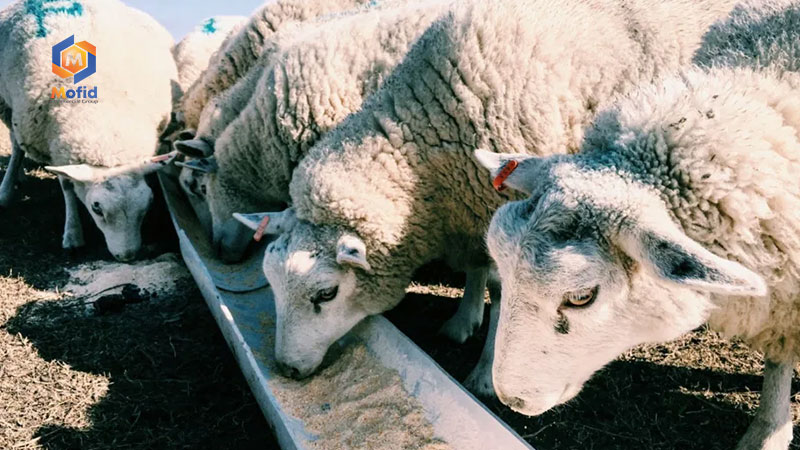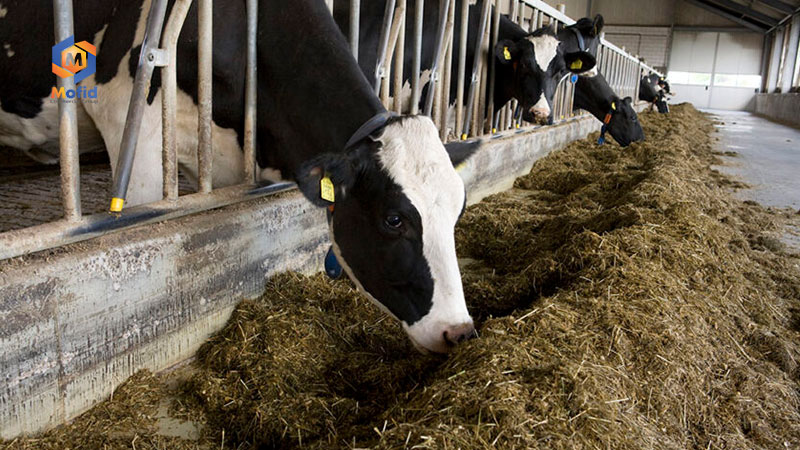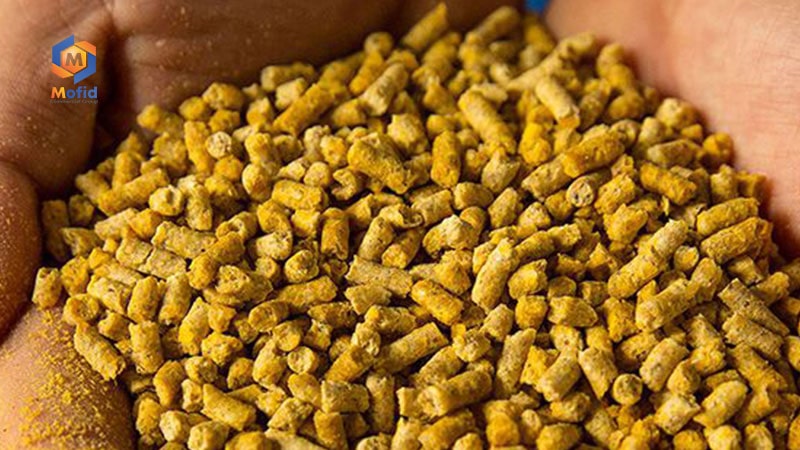What is Bentonite for Livestock and Poultry Feed?
Bentonite for livestock and poultry feed is one of the mineral feed additives available in the market, used at a rate of 3 to 10% in the diet of animals and livestock. It acts as a fungicide. Bentonite feed is an absorbent clay whose primary function is to remove fungal toxins such as mycotoxins from the animal’s diet and digestive system. Consuming bentonite feed detoxifies and strengthens the intestinal lining, leading to greater epithelial production. This mineral also contains calcium, potassium, and sodium, which are essential for the growth and health of livestock.
Why Should We Use Bentonite for Livestock and Poultry Feed?
Feed-grade bentonite (bentonite for livestock and poultry) is a multi-functional clay, available in both calcium-bentonite and sodium-bentonite forms, suitable for livestock and poultry consumption. Its absorbent properties reduce intestinal contamination, particularly mycotoxins, and its nutrient minerals promote weight gain in animals. Additionally, bentonite isolates pathogenic agents in the intestine and removes them. Feed-grade bentonite strengthens the intestinal lining and supports epithelial regeneration. With absorbable ions of nutrients like iron, silicon, potassium, calcium, and sodium, it becomes a valuable dietary component.
Bentonite clay is often used for feed production (pelletized feed) or as a toxin binder in silos storing livestock and poultry rations. It serves two key purposes: as an antimicrobial and disinfectant agent for livestock feed and the digestive system and as a growth and weight enhancer due to its diverse micronutrient content. Clay-based feed additives increase animals’ energy by slowing the passage of feed through the intestines, stimulating more enzyme secretion, and improving digestion and nutrient absorption.
The properties of bentonite clay in livestock and poultry feed include the elimination of heavy metals and fungal toxins in the diet. Bentonite’s water and liquid absorption capabilities also make it useful for keeping poultry bedding dry and disinfected. Feed-grade bentonite creates an insoluble complex that prevents aflatoxins from being absorbed through the digestive systems of livestock and poultry.
Role of Bentonite in Livestock Feed
Toxin binders are absorbent substances such as aluminosilicate minerals like bentonite or non-clay minerals like activated charcoal, yeast, lactobacillus bacteria, some plants, and enzymes. Absorbent materials like calcium or sodium bentonite prevent fungi and molds from multiplying and producing toxins by absorbing the water and nutrients they need. The presence of aflatoxin (a toxin produced by fungal contaminants) in cattle feed is highly likely, posing a risk to herd health.
Clay in livestock feed traps toxins, preventing them from entering the bloodstream and eliminating them from the body. Feed-grade bentonite improves cattle immune performance and reduces liver inflammation caused by aflatoxin activity.
Bentonite also has a high buffering capacity, improving ruminant nutrition. Its inclusion in livestock feed improves fermentation quality in the stomach, enhances protein absorption, boosts nitrogen metabolism, increases feed efficiency, reduces pathogens, and aids in aflatoxin absorption and elimination.
Bentonite Animal Feed
According to research, adding 4% bentonite to livestock feed increases herd weight, enhances feed intake, and improves feed conversion rates in the digestive system. Feeding livestock with materials such as bentonite and zeolite, which possess suitable buffering properties and ion-exchange capabilities, can reduce the negative effects of consuming high amounts of concentrated feeds in ruminants. Bentonite also contains essential minerals like calcium. Research indicates that adding 4% clinoptilolite bentonite to the feed of livestock and poultry, such as turkeys, reduces the concentration of ammonia nitrogen in the digestive system and increases protein breakdown. This prevents ammonia poisoning in the herd.
Due to its ability to transfer electrical charge and its large surface area, bentonite interferes with the transfer of ciliated protozoa, reducing bacterial capture rates and increasing the population of beneficial bacteria in the livestock’s digestive system. Bentonite can also absorb amino acids and protect them against fermentation in the rumen, ensuring a higher availability for the animal’s body. Its use protects proteins from fermentation enzymes, making absorption more efficient and faster.
Benefits of Bentonite in Cattle Feed
- Reduces the toxicity and adverse effects of aflatoxins and fungal toxins.
- Enhances the digestibility of feed materials.
- Acts as a pH buffer.
Role of Bentonite in Livestock Feed
Key properties for ruminants:
- Functions as a buffer, preventing increased acidity (acidosis) in the digestive system of cattle.
- Facilitates the excretion of heavy and toxic metals.
- Improves fermentation processes internally, enhancing milk quality.
- Acts as a toxin binder, restricting fungal activity and absorbing aflatoxins.
- Its adhesive properties make it an excellent supplement for pelletized feed production.
- Reduces bloating caused by improper digestion.
- Due to its affordability, it lowers the overall cost of livestock feeding.
- Promotes full digestion of feed, encouraging higher intake and leading to herd weight gain.
- Prevents ammonia poisoning, often caused by urea-based feeds.
Properties of Bentonite in Poultry Feed
Bentonite is used not only in cattle farming but also in poultry farming, where it serves as both feed and bedding material for keeping poultry dry and clean.
Key properties for poultry:
- A high-adhesion pellet binder for concentrated, pelletized feed.
- Strengthens the skeleton of chicks and increases eggshell thickness.
- Slows down the passage of feed through the digestive system, improving feed efficiency and overall weight gain.
- Acts as a toxin binder, neutralizing harmful effects of mycotoxins, especially aflatoxins.
- Enhances egg quality, enriches yolk color, and boosts nutritional value.
- Removes heavy and toxic metals, preventing poisoning in poultry.
Bentonite in Concentrate Production
In recent years, specially processed bentonite has gained attention for use in livestock and poultry feed. In addition to its nutritional and physiological benefits, bentonite reduces the overall cost of feed. This Mineral Bentonite is increasingly used in livestock, poultry, and aquaculture rations due to its affordable price and numerous advantages.
Applications of Bentonite in Concentrate Feed:
- Pellet Binder: Absorbs moisture in conditioners and swells to enhance pellet durability.
- Ammonia Reduction: Helps lower ammonia levels in poultry houses.
- Bedding Moisture Control: Reduces moisture levels in bedding, improving farm conditions.
- Improved Nutrient Absorption: Enhances the uptake of nutrients in animals.
- Toxin Management: Controls fungal toxin poisoning, particularly aflatoxins.
Research Findings on Bentonite in Animal Feed
In addition to the benefits mentioned, such as reducing aflatoxin toxicity and acting as a pH buffer, studies conducted at the University of Illinois in the United States show that bentonite improves the digestibility of feed. Dairy farms in the U.S. use clay-based bentonite as a feed supplement to reduce aflatoxin toxicity and subacute ruminal acidosis in dairy cattle.
In one scientific study, researchers placed cow feed inside a mesh bag and inserted it into the animal’s stomach (via a fistula). They retrieved the feed at 2 to 4-hour intervals and analyzed it. Results showed that incorporating 2% bentonite with alfalfa feed maximized fat digestibility in the diet.
Bentonite binds positively charged ions and acidifies the rumen, particularly when dairy cattle concentrate is used. This acidification enhances milk quality.



